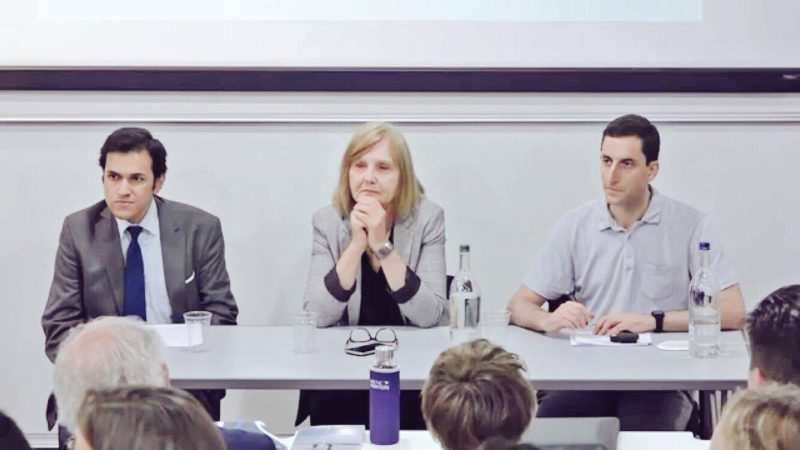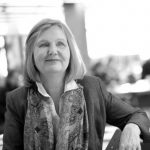Arctic Borders Governance: Emerging Themes and Challenges
Date: 2017-08-29 18:30:00 PM - 2017-08-29 20:00:00 PM
Venue: Sir David Davies Lecture Theatre, Roberts Building G08, University College London, Torrington Place, London WC1E 7JE
Event Website: https://www.eventbrite.co.uk/e/arctic-borders-governance-emerging-themes-and-challenges-tickets-36970571976

Panel Discussion
An interdisciplinary panel discussion on Arctic Borders Governance was held on 29 August 2017 at Sir David Davies Lecture Theatre, Roberts Building G08, University College London. The event was hosted by Polar Research and Policy Initiative (PRPI), in collaboration with UCL Global Governance Institute, UCL Institute for Risk and Disaster Reduction, UCL Institute for Global Health, Trent University (Canada) and the Social Sciences and Humanities Research Council of Canada (SSHRC). You can watch a recording of this discussion here.
https://www.youtube.com/watch?v=nid2KkQCoeg&feature=youtu.be
The panel discussion looked at security in Arctic and sub-Arctic borderlands, with a focus on border governance, addressing questions such as: How do Arctic states, like the US, Canada, Norway, Sweden, Finland and Russia, see and manage their Northern borders? What challenges might they face in border governance? How do state and non-state actors respond to disasters that have cross-border implications? How do Indigenous peoples interact with Northern borders? What options might there be for greater cooperation between Northern states? Are there relevant models for border governance elsewhere that might be worth exploring?
Our panellists included:
-
Professor Heather Nicol, Professor, Trent University, Canada
-
Dr Ilan Kelman, Reader, University College London
-
Dr Dwayne Menezes, Director, Polar Research and Policy Initiative
-
Moderator: Guy Yeomans, Founder and Director, Arctic Futures
Panellist Bios:

Professor Heather Nicol
Professor, Trent University (Canada)
Dr Heather Nicol is Professor in the School of the Environment at Trent University, Canada. She recieved her BA from the University of Toronto, her MES from York University and her PhD from Queen’s University. Her research and teaching interests lie in political and regional studies emphasising borders and borderlands and the circumpolar North. Her research is focused on exploring the dynamics which structure the political geography of the circumpolar North, with a specific focus on the North American Arctic and Canada-US relations. Her work deals with cross-border relations, tensions, geopolitical narratives and mappings of power and sovereignty. Dr Nicol is also involved in the Thematic Network on Geopolitical and Security through the University of the Arctic and the Northern Research Foundation, and she is the Associate Editor for the Northern Series at Athabasca University. She was the 2015-16 Visiting Fulbright Chair to the University of Washington, at the Centre for Canadian Studies and the Henry M. Jackson School of International Studies.

Dr Ilan Kelman
Reader, UCL Institute for Risk and Disaster Reduction and UCL Institute for Global Health; Thematic Director, UCL Global Governance Institute, University College London (UK)
Dr Ilan Kelman is Reader in Risk, Resilience and Global Health at UCL Institute for Risk and Disaster Reduction and UCL Institute for Global Health, University College London. He is also Thematic Director for Global Environmental Sustainability at the UCL Global Governance Institute; Professor II at the University of Agder, Norway; and Co-Director of Many Strong Voices (MSV). His overall research interest is linking disasters and health, including the integration of climate change into disaster research and health research. He focuses mainly on polar regions and island communities. This work covers three main areas: i) Peace and Conflict: How and why disaster-related interventions (disaster diplomacy, including for climate-related hazards) and health-related interventions (health diplomacy, including pandemics) do and do not influence conflict and cooperation; ii) Island Sustainability: Creating and maintaining safer and healthier communities on islands and in isolated areas, such as border, Arctic, and mountain communities; and iii) Risk Education: Increasing the effectiveness and impact of risk education, focusing on health and disaster risks, including climate change.

Dr Dwayne Menezes
Founder and Director, Polar Research and Policy Initiative (PRPI) and Human Security Centre (HSC)
Dr Dwayne Menezes is the Founder and Director of Polar Research and Policy Initiative (PRPI) and Human Security Centre (HSC). He is also the Head of the Secretariat of the All-Party Parliamentary Group for Yemen in the UK Parliament; Honorary Fellow at the UCL Institute for Risk and Disaster Reduction at University College London; and Associate Fellow at the Institute of Commonwealth Studies, University of London. Formerly, he served as Consultant to the Secretary-General of the Commonwealth; Principal Consultant to the European Parliament Intergroup on Freedom of Religion or Belief; and Research Associate to a UN Special Rapporteur. Dr Menezes read History at the LSE and University of Cambridge, graduating from the latter with a PhD in History. He also served as Research Associate at the Centre of Governance and Human Rights (CGHR), University of Cambridge; Visiting Academic at the Centre on Migration, Policy and Society (COMPAS), University of Oxford; and Postdoctoral Research Fellow at Heythrop College, University of London. He is the Director of Think-Film Impact Production (TFIP) and Associate Producer of four films: My Enemy, My Brother (2015, 2017); La Soledad (2016); Complicit (2017); and The Number (2017).
Moderator:

Guy Yeomans
Founder and Director, Arctic Futures

Go back





